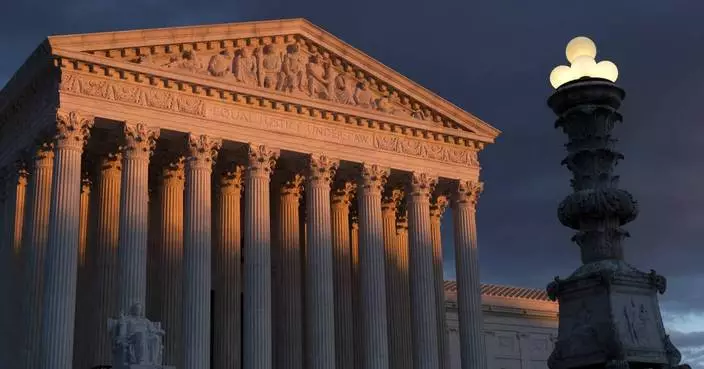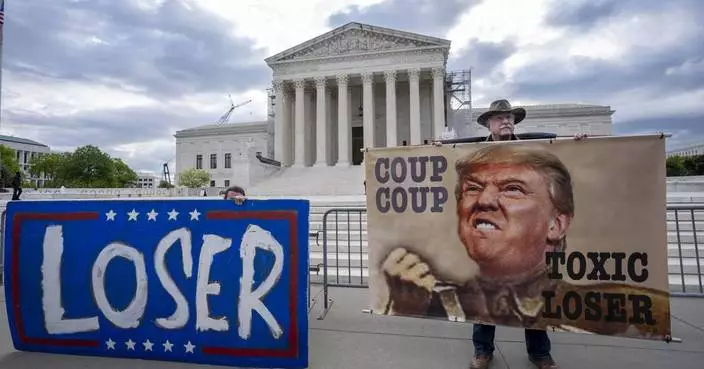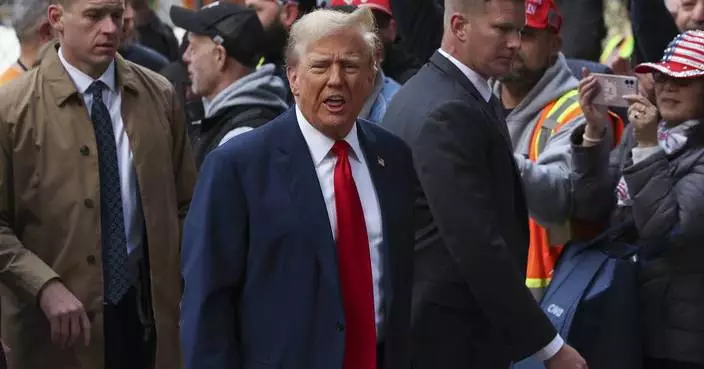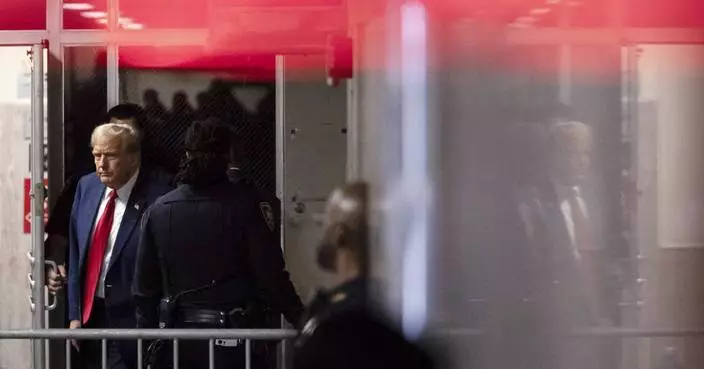When North Korea slammed U.S. Vice President Mike Pence and national security adviser John Bolton, its language was very blunt and impolite. But it was milder than its typical crude and inflammatory insults unleashed on other top U.S. and South Korean officials.
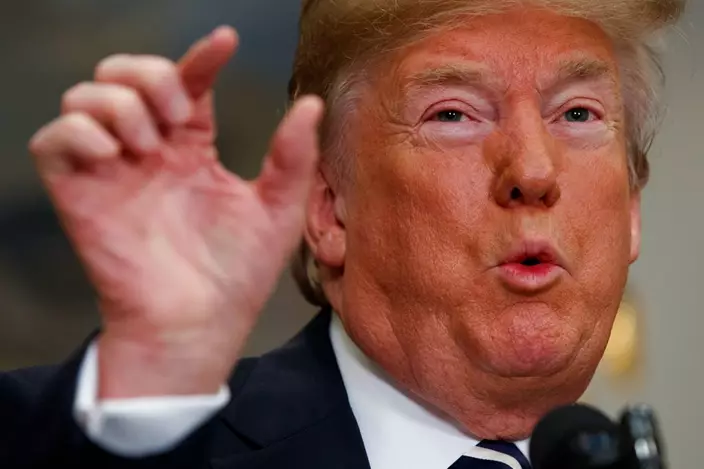
President Donald Trump speaks about North Korea before signing the "Economic Growth, Regulatory Relief, and Consumer Protection Act," in the Roosevelt Room of the White House, Thursday, May 24, 2018, in Washington (AP Photo/Evan Vucci)
The North likely had just tried to strengthen its position in negotiations on the amount of concessions it could wrest from the United States in return for giving up its nuclear program.
But its calling Pence a "political dummy" was still strong enough for President Donald Trump to cite North Korea's hostility in scrapping his planned June 12 summit with North Korean leader Kim Jong Un, at a time when the president faced mounting pessimism at home about Kim's commitment to disarming.
Apparently startled at Trump's abrupt move, a senior North Korean official who touched off his country's recent rhetorical attacks on Washington issued an unusually conciliatory statement Friday saying the North still wants to engage with the United States.
A look at how North Korea's statements have evolved over the past nine days, from harsh criticism of U.S. officials and threats to cancel the summit to a near apology:
___
BOLTON CRITICISM
After canceling a high-level dialogue with South Korea, North Korean Vice Foreign Minister Kim Kye Gwan on May 16 issued a statement threatening to do the same with the Kim-Trump talks if the United States continues to "drive us into a corner to force our unilateral nuclear abandonment."
Kim Kye Gwan categorically took issue with the remarks by Bolton that North Korea should follow the "Libyan model," which many experts say meant the North must take complete nuclear disarmament steps before getting major sanctions relief or other outside benefits.
"We shed light on the quality of Bolton already in the past, and we do not hide our feeling of repugnance toward him," Kim Kye Gwan was quoted as saying in the statement carried by the Korean Central News Agency.
Kim Kye Gwan's wording was weaker than a previous salvo North Korea fired off about the hawkish U.S. official.
In 2003, North Korea's state media called Bolton "human scum" after he described then North Korean leader Kim Jong Il, the late father of Kim Jong Un, as a "tyrannical dictator." In 2007, when Bolton raised strong skepticism about North Korea's previous disarmament pledges, state media said he "talked trash" and that he is "ill-famed for speaking ill of the countries standing for progress and peace."
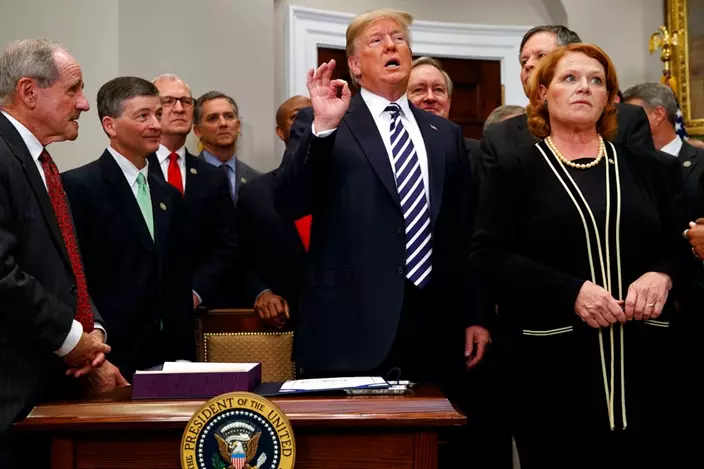
President Donald Trump answers a question about North Korea after signing the "Economic Growth, Regulatory Relief, and Consumer Protection Act," in the Roosevelt Room of the White House, Thursday, May 24, 2018, in Washington (AP Photo/Evan Vucci)
___
PENCE CRITICISM
This directly prompted Trump to say that it is "inappropriate" to go ahead with the summit because of the "tremendous anger and open hostility" displayed in the North's "most recent statement."
In remarks carried by state media on Thursday, Choe Son Hui, another North Korean vice foreign minister, called Pence a "political dummy" over his comments during a Fox News interview that again compared North Korea with Libya.
"As a person involved in the U.S. affairs, I cannot suppress my surprise at such ignorant and stupid remarks gushing out from the mouth of the U.S. vice president," Choe said. "In case the U.S. offends against our goodwill and clings to unlawful and outrageous acts, I will put forward a suggestion to our supreme leadership for reconsidering the (North)-U.S. summit."
Choe's "political dummy" comment was certain to anger the United States. But again, in the past, North Korea attacked others including Trump using worse language.
At the height of nuclear tensions between the countries last year, Kim Jong Un personally called Trump "the mentally deranged U.S. dotard" after Trump portrayed him as "the Rocket Man" on a "suicide mission." His propaganda machine called Trump a "war maniac" and "mad man."
North Korea's state media called former President Barack Obama a "monkey," and his secretary of state, John Kerry, a wolf with a "hideous lantern jaw." They called South Korea's former conservative presidents Park Geun-hye a "prostitute" and Lee Myung-bak a "rat."

A protester wearing a mask of U.S. President Donald Trump, center, performs with cut-out photos of North Korean leader Kim Jong Un and South Korean President Moon Jae-in, right, during a rally against the United States' policies against North Korea near the U.S. embassy in Seoul, South Korea, Friday, May 25, 2018. North Korea said Friday that it's still willing to sit down for talks with the United States "at any time, at any format" just hours after President Donald Trump abruptly canceled his planned summit with the North's leader Kim Jong Un. The signs read " Apology." (AP Photo/Ahn Young-joon)
___
LETTER OF APOLOGY
About eight hours after Trump publicly called off the summit, Kim Kye Gwan issued a lengthy statement saying North Korea is still willing to sit down with the United States "at any time, in any format."
"The first meeting would not solve all, but solving even one at a time in a phased way would make the relations get better rather than making them get worse. The U.S. should ponder over it," Kim Kye Gwan said.
Kim Kye Gwan called Trump's decision "very regrettable" but his statement still apparently focused on stressing that Trump misunderstood the North's true intensions. Experts say it was obvious the North had no plans to walk away from the U.S. summit from the beginning.
It was also highly unusual for the North to make such a quick response to any major policy announcements by Washington and Seoul, and especially one that is so conciliatory in tone.
"What appears to be close to an apology letter was contained in Kim Kye Gwan's statement," said Koh Yu-hwan, a professor at Seoul's Dongguk University.
Choi Kang, vice president of Seoul's Asan Institute for Policy Studies. said he believes Trump used the Pence criticism as a way to pull out of the summit because his government wasn't sure if North Korea would disarm in a manner that he wants.
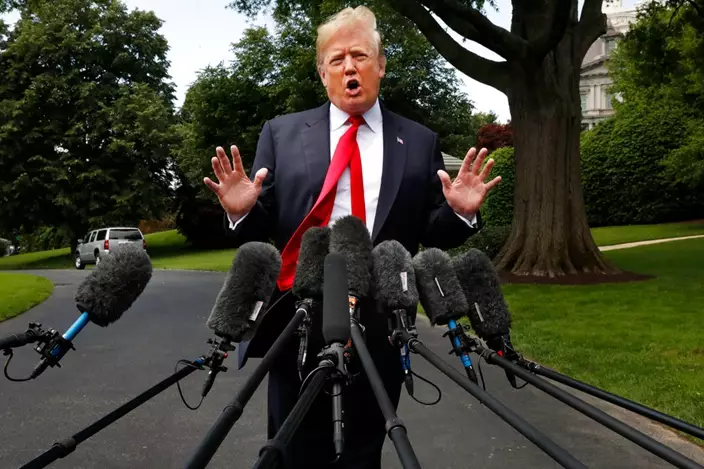
President Donald Trump's hair is ruffled by a breeze as he speaks to the media on the South Lawn of the White House in Washington, Wednesday, May 23, 2018, en route to a day trip to New York. Trump will hold a roundtable discussion on Long Island on illegal immigration and gang violence that the White House is calling a "national call to action for legislative policy changes." (AP Photo/Jacquelyn Martin)
WASHINGTON (AP) — Coal-fired power plants would be forced to capture smokestack emissions or shut down under a rule issued Thursday by the Environmental Protection Agency.
New limits on greenhouse gas emissions from fossil fuel-fired electric plants are the Biden administration's most ambitious effort yet to roll back planet-warming pollution from the power sector, the nation’s second-largest contributor to climate change. The rules are a key part of President Joe Biden's pledge to eliminate carbon pollution from the electricity sector by 2035 and economy-wide by 2050.
The rule was among four measures targeting coal and natural gas plants that the EPA said would provide “regulatory certainty” to the power industry and encourage them to make investments to transition “to a clean energy economy.” The measures include requirements to reduce toxic wastewater pollutants from coal-fired plants and to safely manage coal ash in unlined storage ponds.
EPA Administrator Michael Regan said the rules will reduce pollution and improve public health while supporting the reliable, long-term supply of electricity that America needs.
“One of the biggest environmental challenges facing our nation is man-made pollution that damages our air, our water and our land," Regan said in a speech at Howard University. “Not only is this pollution a major threat to public health — it’s pushing our planet to the brink.''
Regan called the power plant rules “a defining moment” for his agency as it works to "build a cleaner and healthier future for all of us.''
The plan is likely to be challenged by industry groups and Republican-leaning states. They have repeatedly accused the Democratic administration of overreach on environmental regulations and have warned of a looming reliability crisis for the electric grid. The rules issued Thursday are among at least a half-dozen EPA rules limiting power plant emissions and wastewater pollution.
Environmental groups hailed the EPA’s latest action as urgently needed to protect against the devastating harms of climate change.
The power plant rule marks the first time the federal government has restricted carbon dioxide emissions from existing coal-fired power plants. The rule also would force future electric plants fueled by coal or gas to control up to 90% of their carbon pollution. The new standards will avoid 1.38 billion metric tons of carbon pollution through 2047, equivalent to the annual emissions of 328 million gas cars, the EPA said, and will provide hundreds of billions of dollars in climate and health benefits, measured in fewer premature deaths, asthma cases and lost work or school days.
Coal plants that plan to stay open beyond 2039 would have to cut or capture 90% of their carbon dioxide emissions by 2032, the EPA said. Plants that expect to retire by 2039 would face a less stringent standard but still would have to capture some emissions. Coal plants that are set to retire by 2032 would not be subject to the new rules.
Rich Nolan, president and CEO of the National Mining Association, said that through the latest rules, “the EPA is systematically dismantling the reliability of the U.S. electric grid.''
He accused Biden, Regan and other officials of “ignoring our energy reality and forcing the closure of well-operating coal plants that repeatedly come to the rescue during times of peak demand. The repercussions of this reckless plan will be felt across the country by all Americans.”
Regan denied that the rules were aimed at shutting down the coal sector, but he acknowledged in proposing the power plant rule last year that, “We will see some coal retirements.”
The proposal relies on technologies to limit carbon pollution that the industry itself has said are viable and available, Regan said. “Multiple power companies have indicated that (carbon capture and storage) is a viable technology for the power sector today, and they are currently pursuing those CCS projects,'' he told reporters Wednesday.
Coal provided about 16% of U.S. electricity last year, down from about 45% in 2010. Natural gas provides about 43% of U.S. electricity, with the remainder from nuclear energy and renewables such as wind, solar and hydropower.
Dan Brouilette, president and CEO of of the Edison Electric Institute, which represents U.S. investor-owned electric companies, said he was “disappointed" that the EPA “did not address the concerns we raised about carbon capture and storage.'' While promising, the technology "is not yet ready for full-scale, economy-wide deployment,'' Brouilette said.
The rules initially included steps to curb emissions from existing natural gas plants, but Regan delayed that aspect of the rules until at least next year, saying he wanted to address complaints from environmental justice groups that the earlier plan allowed too much toxic air pollution that disproportionately harms low-income neighborhoods near power plants, refineries and other industrial sites.
Even so, the rules issued Thursday complete "a historic grand slam” of major actions by the Biden administration to reduce carbon pollution, said David Doniger, a climate and clean energy expert at the Natural Resources Defense Council. The first and most important action was passage of the 2022 climate law, officially known as the Inflation Reduction Act, he said, followed by separate EPA rules targeting tailpipe emissions from cars and trucks and methane emissions from oil and gas drilling.
Together, the climate law and the suite of EPA rules “are the biggest reductions in carbon pollution we've ever made and will put the country on the pathway to zero out carbon emissions,'' Doniger said.
The nation still faces challenges in eliminating carbon from transportation, heavy industry and more, said Abigail Dillen, president of the environmental group Earthjustice, "but we can't make progress on any of it without cleaning up the power plants.''
Jim Matheson, CEO of the National Rural Electric Cooperative Association, called the EPA rule "unlawful, unrealistic and unachievable,” adding that it faced a certain court challenge. The rule disregards the Supreme Court’s 2022 decision that limited the agency’s ability to regulate carbon pollution under the Clean Air Act, Matheson said.
“This barrage of new EPA rules ignores our nation’s ongoing electric reliability challenges and is the wrong approach at a critical time for our nation’s energy future,” said Matheson, whose association represents 900 local electric cooperatives across the country.
The EPA rules would not mandate use of equipment to capture and store carbon emissions — a technology that is expensive and still being developed. Instead, the agency would set caps on carbon dioxide pollution that plant operators would have to meet. Some natural gas plants could start blending gas with other fuel sources that do not emit carbon, although specific actions would be left to the industry.
Still, the regulation is expected to lead to greater use of carbon capture equipment. Only a handful of projects are operating in the country despite years of research.
The EPA also tightened rules aimed at reducing wastewater pollution from coal-fired power plants and preventing harm from toxic pits of coal ash, a waste byproduct of burning coal.
Coal ash contains cancer-causing substances like arsenic and mercury that can leach into the ground, drinking water and nearby rivers and streams, harming people and killing fish. The waste is commonly stored in ponds near power plants. The EPA issued rules in 2015 to regulate active and new ponds at operating facilities, seven years after a disaster in Kingston, Tennessee, that flooded two rivers with toxic waste and destroyed property.
Environmental groups challenged that rule, arguing it left a large amount of coal ash waste unregulated by the federal government. The rule issued Thursday forces owners to safely close inactive coal ash ponds and clean up contamination.
A separate rule will reduce toxic wastewater pollution by 660 million pounds annually, according to federal officials. It’s a reversal of the Trump administration’s push to loosen coal plant wastewater standards.
Associated Press writer Michael Phillis in St. Louis contributed to this story.
Follow the AP's coverage of the EPA at https://apnews.com/hub/us-environmental-protection-agency.
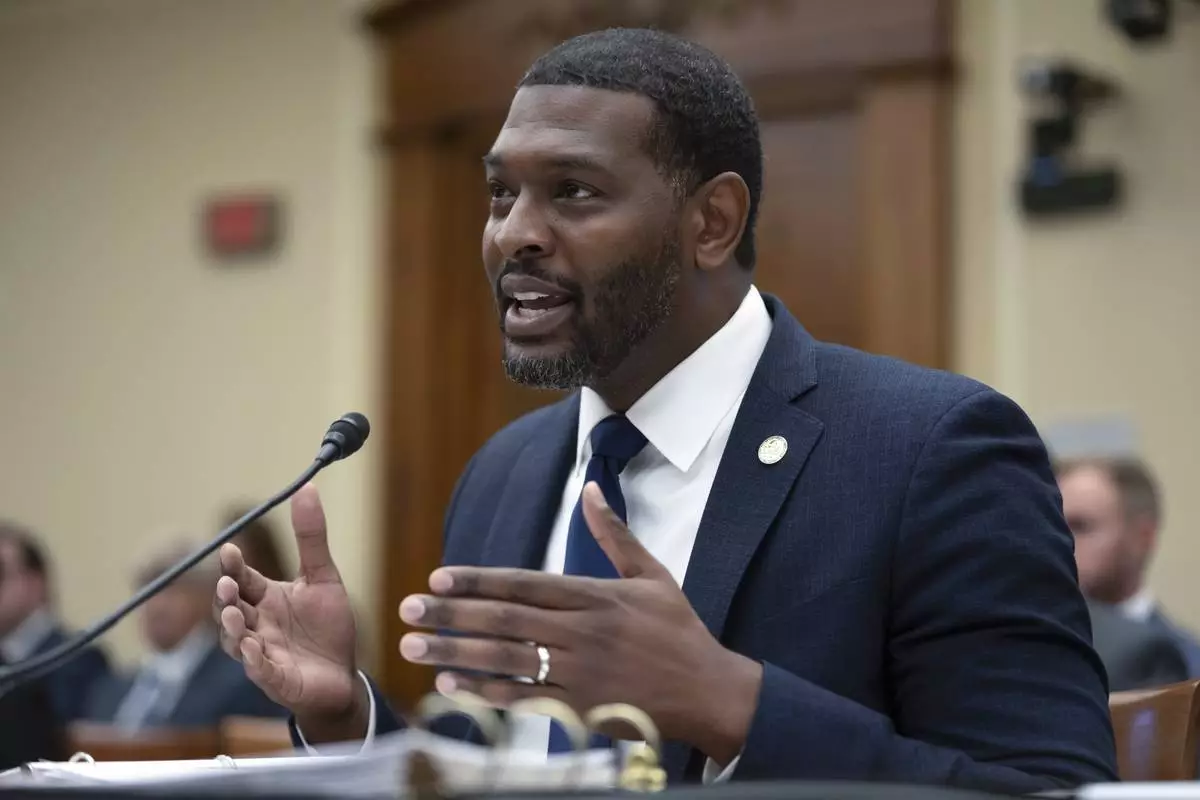
FILE - Environmental Protection Agency Administrator Michael Regan speaks during a hearing on Capitol Hill, Sept. 27, 2023, in Washington. A rule issued April 25, 2024, by the EPA would force power plants fueled by coal or natural to capture smokestack emissions or shut down. (AP Photo/Mark Schiefelbein, File)
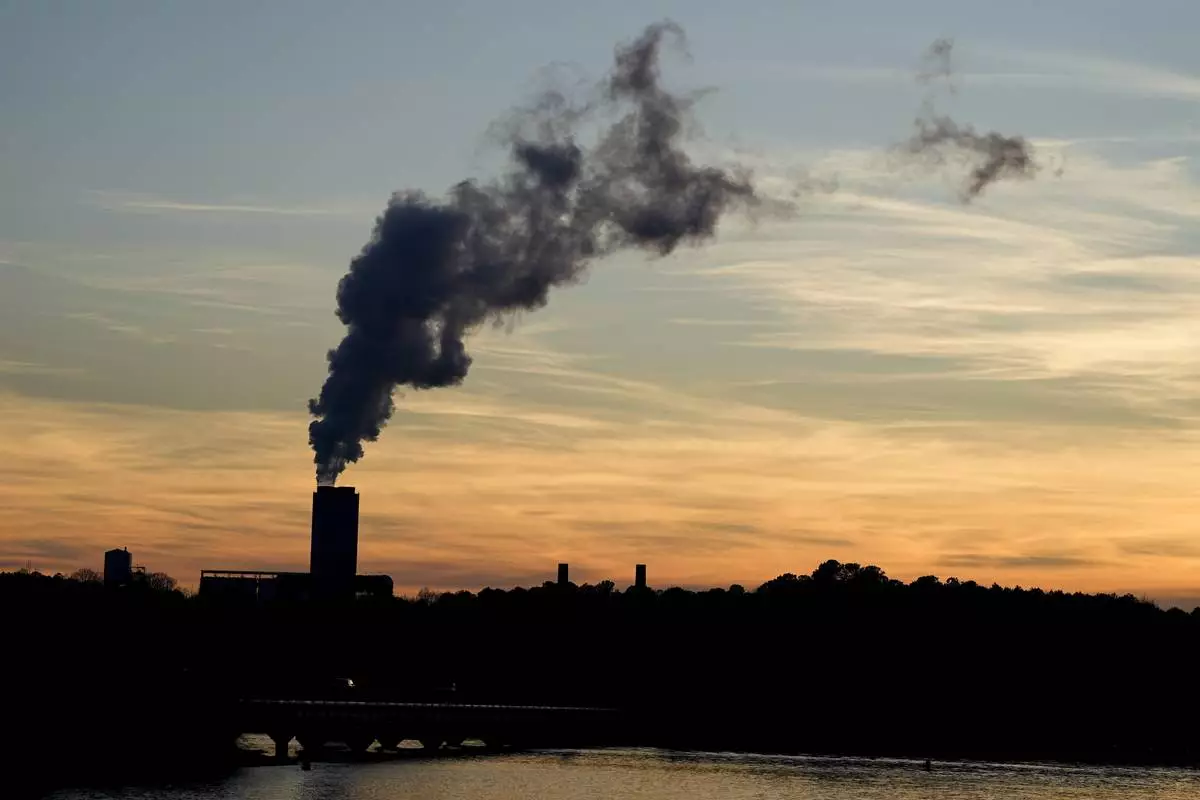
FILE - The Marshall Steam Station coal power plant operates March 3, 2024, near Mooresville, N.C. A rule issued April 24, 2024, by the Environmental Protection Agency would force power plants fueled by coal or natural to capture smokestack emissions or shut down. (AP Photo/Chris Carlson, File)









